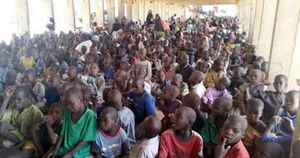North Korea has recently taken to the seas with its latest display of military might, launching multiple short-range ballistic missiles just hours before the U.S. presidential election. This aggressive move has raised eyebrows among neighboring countries and the international community.
According to the South Korean military, the North Korean missile launches occurred early Tuesday morning, with at least seven missiles being fired from the western coast of the country. The missiles reportedly traveled approximately 400 kilometers (about 250 miles) at altitudes reaching up to 100 kilometers (60 miles) before splashing down harmlessly in the waters between the Korean Peninsula and Japan, outside Japan's exclusive economic zone.
Japanese Defense Minister Gen Nakatani condemned the launches, emphasizing their potential threat to regional peace and security. “North Korea’s actions, including repeated missile launches, threaten the peace and safety of Japan, the region and the international community,” Nakatani stated after confirming the missile activity.
This latest round of missile tests is part of a broader strategy by North Korea, likely aimed at garnering attention from Washington during the heated U.S. election period. South Korean intelligence officials anticipate intensified military activity from North Korea as the election approaches, with expectations of more demonstrations intended to influence U.S. policy.
On the international stage, the timing of the missile launches follows North Korean leader Kim Jong Un's recent flight test of the Hwasong-19 intercontinental ballistic missile (ICBM), which is claimed to have the capability to reach the U.S. mainland. Following this launch, the United States showcased its military strength by deploying long-range B-1B bombers alongside South Korean and Japanese forces to conduct trilateral military drills. This display of force was met with strong words from Kim Yo Jong, Kim Jong Un’s sister, who accused the U.S. and its allies of increasing tensions through “aggressive and adventuristic military threats.”
Analysts highlight the importance of these missile tests as North Korea attempts to leverage its military advancements. The missile testing regime coincides with growing speculation about North Korea's ambitions of conducting its seventh nuclear test, with military officials noting the regime's preparations are likely complete. Outside analysts suggest North Korea seeks to use its expanded nuclear arsenal as leverage for future negotiations, particularly as the U.S. government transitions to new leadership.
The geopolitical dynamics surrounding these events suggest Kim Jong Un may prefer a return to power for former President Donald Trump, with whom he previously engaged in high-stakes nuclear negotiations. Trump is viewed by some analysts as potentially more accommodating than his Democratic opponent, Vice President Kamala Harris, who has publicly committed to not engaging with North Korea’s leadership.
This suspension of dialogue could pose challenges for the Biden administration, which has emphasized denuclearization talks as central to its foreign policy stance concerning North Korea. Meanwhile, voices within Washington warn against prolonging the status quo as North Korea’s missile capabilities continue to develop.
Continued military partnerships among South Korea, Japan, and the United States also reflect rising concerns over North Korea’s ambitions. Officials have noted the need for enhanced joint military exercises as well as improved nuclear deterrence measures. North Korea has long viewed such military maneuvers as rehearsals for invasion, utilizing these perceptions to justify its weapons programs.
At the United Nations, North Korea’s ambassador defended its military capabilities as necessary for national defense, framing them as reactions to perceived threats from the U.S. This narrative bolsters the regime's domestic propaganda, portraying itself as the defender of the nation.
Further complicate the situation, assessments indicate North Korean troops are reportedly being sent to support Russia’s campaigns against Ukraine, raising alarms about potential military technology exchanges between the two nations. Concerns about Russia potentially supplying nuclear and missile technology to North Korea in exchange for military support are also being voiced, reflecting the broader geopolitical ramifications of North Korea’s current military strategies.
After the latest launches, South Korea, Japan, and the U.S. have committed to increasing communication and coordination to monitor North Korea's military activities more effectively. The trilateral exercises are portrayed as attempts to shore up defenses against the backdrop of North Korea’s growing capabilities.
Despite North Korea’s claims about its missile advancements, experts warn the nation still faces significant technical challenges. Analysts point out the country's arsenal may still lack key technologies needed for effective ICBM deployment, especially concerning missile re-entry capabilities.
North Korea remains adamant about bolstering its military forces and continuing with missile tests, especially during politically sensitive times. With tensions on the Korean Peninsula at their highest point in years, the international community watches closely as North Korea continues to navigate complex geopolitical waters associated with its military ambitions and its interactions with countries like the U.S. and Russia. The coming months will likely dictate the pace of North Korea's continued military provocations and their effects on global peace and stability.



